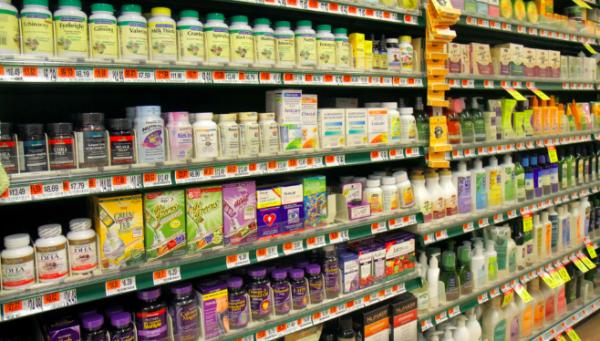Everyone these days wants to lead a chemical-free natural life where they will be immune from any maladies by getting with the program. Here is my version of the program.
- Eat only chemical-, preservative-, and pesticide-free (1) organic GM-free foods which are grown within 5 miles from their homes and hand carried in a wicker basket to the food coop.
- Never touch a plastic container.
- Never take a prescription drug.
- Sleep only on 100% organic cotton sheets and hemp pillows (2).
- Take medical advice from Deepak Chopra.
- And, just to top it off, give your immune system the boost it needs by taking a whole bunch of...
Dietary supplements!
Perhaps, if you follow the program meticulously you'll live long enough to see Elon Musk's next brilliant visionary plan. Maybe colonizing Pluto with zebras.
But this is unlikely. As I have written numerous times before (See DSHEA Allowed 23 Yrs Of Disgraceful Cancer Claims By Supplement Makers) taking dietary supplements is not so great because there is very little evidence that any of them work, and they can be risky because you never know what's in the bottle. Not unlike a slot machine.

WARNING! If your diet is not providing you with sufficient Horny Goat Weed you may be at risk. This statement has not been evaluated by the Food and Drug Administration. This product is not intended to diagnose, treat, cure, or prevent any disease.
So it should come as no surprise that a new JAMA Network paper found a whole bunch of junk in a whole bunch of bottles of dietary supplements. So, instead of being merely worthless, the stuff in the bottle can be both worthless and outright dangerous.
The new article, entitled "Unapproved Pharmaceutical Ingredients Included in Dietary Supplements Associated With US Food and Drug Administration Warnings," which was written by Jenna Tucker, MPH, makes it clear that adulterated supplements are rather common.
The authors, who are not affiliated with the FDA (3), collected FDA data on tainted supplements between 2007 and 2016. Here is a summary of what they found:
- There were data on 776 adulterated supplement products during that time period.
- An astounding number (146) of companies were implicated. If this doesn't stink of a "fly-by-night" operation I don't know what does.
- As was frequently the case in the past, more than 98% of the adulterated supplements were intended to treat erectile dysfunction (ED), promote weight loss, or build muscle.
- Not surprisingly, the adulterant was a drug, approved or not, that actually has a real pharmacological effect. In other words, it does something.
- Supplements to treat ED were spiked with sildenafil (the generic name for Viagra).
- Supplements to promote weight loss were spiked with sibutramine, a drug that was previously sold as Meridia.
- Supplements to promote muscle building had all kinds of crap in them, mostly anabolic steroids (4).
So, what's the harm of sneaking a little active pharmaceutical substance into the bottle of nothing? These are all safe and approved drugs, right?
No, they're not. If you take "Herbal Viagra" one of two things will happen: 1) Nothing (if it is not adulterated with sildenafil), or, 2) Lord Stiffington will stand up and salute if it is adulterated with sildenafil. But he will do so only if the supplement is spiked with the real drug. The problem is that sildenafil is a vasodilator and has interactions with a number of drugs, especially nitroglycerine, which is taken for angina. It is very dangerous to take the two together.
Sibutramine/Meridia, which is a stimulant, was sold as an adjunct to diet and exercise to help people lose weight until 2010. But it was discovered that people who took it had a higher incidence of heart attacks and strokes, so it was yanked from the market in the US and a bunch of other countries as well.
There are a number of steroids that are anabolic (muscle building). What better way to spike a muscle-building supplement than tossing in an anabolic steroid. Not much to worry about here, that is unless you're concerned about:
Severe acne, oily skin and hair, hair loss, liver disease (tumors and cysts), kidney disease, heart disease, such as heart attack and stroke, altered mood, irritability, increased aggression, depression or suicidal tendencies, alterations in cholesterol and other blood lipids, high blood pressure, gynecomastia (abnormal development of mammary glands in men causing breast enlargement)., shrinking of testicles, azoospermia (absence of sperm in semen), menstrual irregularities in women,infertility, excess facial or body hair (hirsutism), deeper voice in women, stunted growth and height in teens. (Source: Drugs.com)
Aside from that, it's all good.
Americans just love their dietary supplements. To the tune of $36 billion in 2017, yet the industry is largely unregulated. Pretty crazy, if you ask me.
Source: JAMA Network Open. 2018;1(6):e183337. doi:10.1001/jamanetworkopen.2018.3337
NOTES:
(1) The organic food industry wants us to believe that their produce is grown without pesticides or herbicides. This is false.
(2) Yes, there really is such a thing.
(3) Do not blame the FDA for this. Their hands are tied. The appalling Dietary Supplement Health and Education Act of 1994 (DSHEA), which was pushed through Congress by Senators Orrin Hatch and Tom Harkin and signed by President Clinton, is a scientific and medical abomination. When something is marketed as a dietary supplement the FDA has no say in its approval; the agency can act only after a problem has been discovered. (See J. Bloom and D. Seres: Science Vs. Politics On Supplements: Who Do You Believe?
(4) Anabolic steroids sold next to vitamins in drug stores??? Can this really be true?

I guess so.




